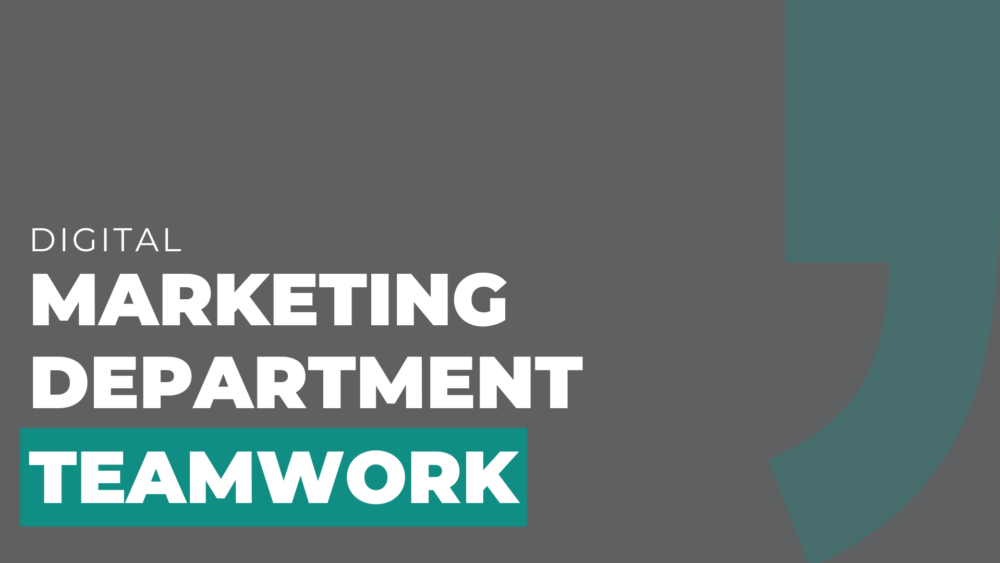“To build a strong team you must see someone else’s strength as a complement to your weakness not a threat to your position or authority.” – Christine Caine
Working together as a team is essential for the success of any organization.
We depend on teamwork here at MOCK, the Agency.
Teamwork is absolutely necessary in any creative agency or marketing department.
Working in collaboration with colleagues can help to ensure that everyone’s skills are being used to their fullest potential, leading to more effective campaigns and better results for the company overall.
To help build marketing teamwork, the key is really to create an environment where creative ideas are exchanged freely, allowing each team member to contribute their unique set of skills and knowledge.
This exchange of ideas helps foster innovative solutions which may not have been possible if working independently.
With teams working together towards a common goal, it becomes easier to identify opportunities or problems before they become unmanageable issues down the line.
Ultimately, when all members feel supported by one another and work harmoniously together as a unit, they will be able to achieve greater success than ever before!
Here are some aspects of teamwork we will cover in the upcoming posts:
- Team Management for Marketers
- Learn to Be a Great Team Player
- How to Build Teamwork in a Marketing Team
- Roles that Marketing Teams Need to Succeed
- Team Dynamics Matters: How Personalities Fit Together
- How to Work Through Conflict in a Marketing Team (5 Dysfunctions of a Team)
- What Kinds of Personalities Work in Marketing?
Team Management for Marketers
When managing a team of marketers, your team is nothing without the ability to communicate effectively.
You must have clear, concise, and open communication.
When everyone is on the same page, we can work together towards the team’s goals.
Good management means you need regular team meetings, open dialogue, and helping team member feel heard and valued.
Through this clear line of communication, tasks can be delegated effectively, and you will use each team member’s skills and talents optimally.

If you’re part of management, another thing your employees need you to do is foster a culture of creativity and innovation.
The marketing landscape is ever-evolving, so it’s important to encourage team members to think outside the box and be open to trying new strategies.
Creating an environment where ideas are freely shared without judgment stimulates creative thinking and leads to innovative marketing campaigns.
Yo can also promote continuous learning and professional development.
Keep the team updated with the latest marketing trends and tools.
Doing this will set them up to produce more successful campaigns.
Learn to Be a Great Team Player
“None of us, including me, ever do great things. But we can all do small things, with great love, and together we can do something wonderful.” – Mother Teresa
Being a great team player is about understanding and embracing the concept of collaboration.
What is collaboration?
Collaboration is the process of working together to achieve a common goal.
“Don’t just show up and throw up,” as Don likes to say.
Bring creative solutions that will help the team.
You also need to value everyone’s contributions and understand how individual tasks collectively contribute to the overall campaign.
In a marketing team, this translates into being open to different perspectives, ideas, and strategies.
A team player in a marketing context is someone who will not only chat, but do these three things:
- Listen to their team members
- Value their contributions
- Put the team’s success ahead of individual glory.
They understand the importance of open communication, dependable performance, flexibility, and supporting others in their tasks.
Furthermore, they are ready to step out of their comfort zones and take on different roles if needed for the team’s benefit.
A good team player on your team will also understand their role within the team and how it fits into the larger marketing strategy.
If you want to work together and bring success to your campaigns, your team must be able to collaborate well.

How to Build Teamwork in a Marketing Team
Having your marketing team work together well requires strategic planning and effective leadership.
As director, you can start by facilitating team-building exercises that foster understanding and rapport among team members.
These exercises can range from collaborative projects to team outings, retreats, or even simple brainstorming sessions aimed at solving complex marketing problems.
The key is to create opportunities for team members to connect, understand each other’s strengths and weaknesses, and work together in a relaxed, non-stressful environment.
You should also promote a culture of open communication and transparency.
Regular meetings where everyone can voice their thoughts, ideas, and concerns can help build trust and ensure that everyone is on the same page.
Implementing collaborative tools and software, like project management tools, can also help to streamline communication and ensure all team members are aware of project progress, deadlines, and responsibilities.
Finally, recognize and reward teamwork.
People inherently respond positively to appreciation.
By acknowledging the efforts of the team as a whole and celebrating group accomplishments, you can reinforce the importance of teamwork and encourage further collaboration.
This can be done through public recognition, team rewards, or simply a heartfelt thank-you note.

By taking these steps and other like them, you can help foster a sense of unity and shared purpose within your marketing team.
And this unity leads to more effective and successful campaigns.
Roles that Marketing Teams Need to Succeed
A great marketing team consists of a variety of roles, each contributing their unique skills and perspectives to create effective campaigns.
The Marketing Strategist
One such essential role is that of a Marketing Strategist.
The Marketing Strategist oversees and plans the long-term strategy of the company.
They analyze market trends, consumer behavior, and competitive strategies to ensure that the company’s campaigns remain relevant and effective.
The importance of this role lies in its ability to keep the company’s efforts aligned with its overall business goals and consumer demands.
Content Creator
Another important role in a team is the Content Creator.
Content Creators develop engaging and informative content that resonates with the target audience.
This content be include various kinds of digital marketing including blog posts, social media updates, videos, or even infographics.
You need strong content for your campaign for it to help attract, engage, and eventually convert the target audience.
Social Media Manager
A third key role is the Social Media Manager, responsible for managing and updating the company’s social media platforms.
They create social strategies, schedule posts, interact with followers, and report on the success of these digital campaigns.
Given the growing influence of social platforms in today’s digital age, this role is critical for broadening the company’s reach, building relationships with customers, and improving brand visibility.
Each of these roles contributes uniquely to the overall success of the campaigns and ultimately, to the company’s success.
The Marketing Strategist provides the roadmap, the Content Creator fills the journey with engaging milestones, and the Social Media Manager ensures the message reaches as many people as possible.
Without their combined efforts, your campaign will lack direction, content, and reach, significantly impacting its effectiveness.

Team Dynamics Matters: How Personalities Fit Together
When it comes to building a successful marketing team, you really do need to have a diverse range of personalities.
Each individual brings their own unique qualities and perspectives to the table, which can be incredibly beneficial in helping to create effective campaigns.
One way to ensure that there is an adequate range of personalities present in any given team is by understanding the four main types of color personalities.
The four basic color personalities are:
Red
Red personalities tend to be passionate, impulsive, and decisive but can also be prone to aggression or impatience.
Green
Green personalities, alternatively, are more relaxed and go with the flow.
They prefer working in teams as opposed to taking charge on their own.
Yellow
Yellows are cheery optimists who are enthusiastic about life.
They enjoy coming up with creative solutions and often bring lightheartedness into any situation.
Blue
Blues are analytical thinkers who value logic over emotion.
They can easily see different sides of a situation or argument and make decisions based on facts rather than feelings.
By recognizing the different colors of personality within your team, you’ll be able to have better discussions.
Better discussions = more effective collaborations between members.
With these colors working together harmoniously, you’ll have greater success in achieving your goals as a unit!
How to Work Through Conflict in a Marketing Team (5 Dysfunctions of a Team)
Conflicts within a marketing team, if not addressed promptly, can lead to disarray and inefficiency.
Insights from Patrick Lencioni’s book “The Five Dysfunctions of a Team” can provide useful guidance on navigating through such team conflicts.
Here are the 5 dysfunctions that he says must be addressed to keep the team moving forward:
1. Absence of Trust
Trust is a fundamental part of any team. It provides a safe environment for open communication and sharing ideas.
To build trust within your team, encourage vulnerability and honesty.
Recognize each member’s strengths and weaknesses, and promote understanding and acceptance.
2. Fear of Conflict
Healthy conflict is necessary for a team to grow. It leads to better ideas, decisions, and strategies.
Encourage open dialogue within the team and ensure that disagreements are centered on ideas, not people.

3. Lack of Commitment
When team members are not committed, they are less likely to contribute to a project’s success.
To improve commitment, ensure that each team member understands the team’s objectives and their role in achieving them.
Seek input from all members and make collective decisions.
4. Avoidance of Accountability
Accountability drives performance.
Encourage team members to hold each other accountable for their responsibilities.
This can be achieved through regular check-ins and progress updates.
5. Inattention to Results
Focusing on individual achievements can divert attention from team goals.
Ensure the team is collectively focused on shared outcomes and rewards.
Measure and celebrate team successes together.
By addressing these five dysfunctions, a marketing team can work through conflicts, enhance collaboration, and ultimately, deliver more effective marketing campaigns.
What Kinds of Personalities Work in Marketing?
Marketers need a unique blend of qualities that allow them to craft effective campaigns and connect with a diverse range of consumers.
One of the most significant traits is creativity.
In a field that requires constant innovation to stay ahead of the competition, a marketer’s ability to think outside the box is invaluable.
They must be able to generate fresh, engaging ideas that appeal to their audience and meet their company’s objectives.
Moreover, an eye for detail complements this creative mindset, ensuring that all aspects of a campaign, from the overarching strategy to the smallest design element, are thoughtfully considered and executed.

You also need to be adaptable.
The landscape is constantly evolving, with new trends, technologies, and consumer behaviors emerging regularly.
You must be able to adapt swiftly to these changes, adjusting their strategies as needed to stay relevant and effective.
Additionally, strong communication skills are essential in this role, as you will often work with a variety of stakeholders, including clients, team members, and the public.
They need to articulate their ideas clearly and persuasively, whether in a pitch meeting, a written campaign brief, or a social media post.
Finally, an innate curiosity fuels a marketer’s desire to understand their audience, stay abreast of industry trends, and continuously expand their skills and knowledge.
At the End of the Day
Good marketing department teamwork requires hard work and understanding of each individual’s role and personality, as well as working through conflict.
Each team member must be aware of the other’s strengths and weaknesses, and coordinate to ensure that everyone is working together to reach the desired goals.
It is important for everyone on the team to possess a strong sense of trust in each other.
This trust can only be built through honest communication and openness to constructive criticism.
If they want to be successful, teams must learn how to work through conflict by recognizing the root causes of disagreements and collaborating to find solutions that work best for everyone involved.
With all these factors taken into consideration, a marketing department team can reach its full potential.


Comments are closed.